121 (MBTA bus)
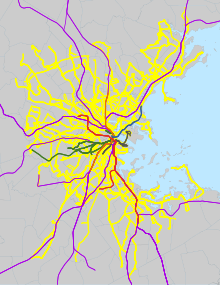
The Massachusetts Bay Transportation Authority bus division operates 151 bus routes in the Boston, Massachusetts metropolitan area. All routes connect to MBTA subway, MBTA Commuter Rail, and/or other MBTA bus services. Many routes are descendants of the streetcar routes of the Boston Elevated Railway, or of suburban companies including the Eastern Massachusetts Street Railway and Middlesex and Boston Street Railway. 147 routes are directly operated by the MBTA, while private companies operate four routes under contract. Four additional suburban operations are partially funded by the MBTA.
Most buses charge local bus fare ($1.70 one-way as of 2024). The Silver Line waterfront services (SL1, SL2, SL3, and SLW) charge the standard subway fare ($2.40 one-way as of 2024). Express buses have a local portion within a community (which charge the local bus fare), and an express portion that takes a highway to or from downtown Boston (which charges a higher fare of $4.25 as of 2024).[1]
A number of routes were temporarily suspended or placed on modified routings during the COVID-19 pandemic; overall service levels were restored to pre-COVID levels in 2021, though some routes were not restored. Since 2018, the MBTA has been planning a major bus network overhaul, with implementation expected to be complete in 2028.[2] The first changes took place in December 2024.[3]
Silver Line

The Silver Line is a six-route bus rapid transit system marketed as rapid transit. It is divided into two branches: Waterfront service (SL1, SL2, SL3, and the rush-hour SLW shuttle) that runs through the South Boston Transitway tunnel, and Washington Street service (SL4 and SL5) that runs on the surface via Washington Street. The Waterfront service costs the same as a subway fare, while the Washington Street service costs a regular bus fare. All Silver Line routes use articulated 60-foot (18 m) buses; the Waterfront routes use hybrid buses with extended battery range for electric operation in the tunnel.
The SL5 route was created in 2002 as a replacement for the Washington Street Elevated. The Shuttle route began operations in 2004, followed by the SL2 and SL3 (former) in 2004 and SL1 in 2005 when dual-mode buses became available. The SL4 was introduced in 2009 as a replacement for the canceled Phase III tunnel. A new SL3 route to Chelsea opened in 2018.[4]
| Route | Description | MBTA link |
|---|---|---|
| SL1 | Logan Airport terminals–South Station | Link |
| SL2 | Drydock Avenue–South Station | Link |
| SL3 | Chelsea–South Station | Link |
| SLW | Silver Line Way–South Station | Link |
| SL4 | Nubian station–South Station | Link |
| SL5 | Nubian station–Downtown Crossing (Temple Place) | Link |
Crosstown
The two crosstown (CT) routes provide limited-stop service on two routes that connect major subway and bus transfer points. Three crosstown routes were created by the MBTA in 1994; route CT1 was merged with route 1 in 2019.[4]
| Route | Description | MBTA link |
|---|---|---|
| CT2 | Sullivan Square station–Ruggles station | Link |
| CT3 | Beth Israel Deaconess Hospital–Andrew station | Link |
1–121
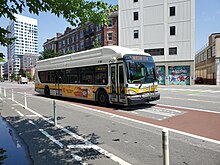
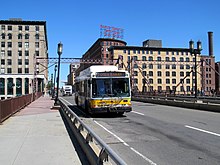

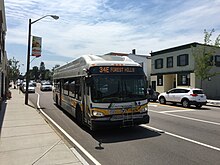

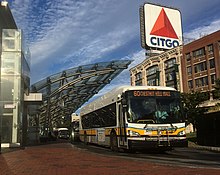
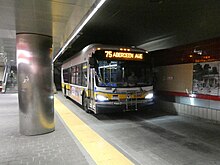
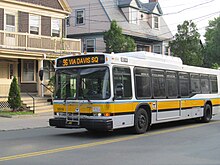
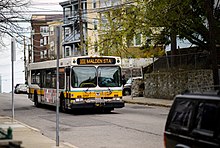

These routes provide almost all local service in the core of the metropolitan area; most were originally Boston Elevated Railway streetcar routes. They were originally numbered roughly clockwise from southeast to northeast, with 4 the furthest south in South Boston and 121 the furthest north (roughly) in East Boston. The BERy folded into the Metropolitan Transit Authority in 1947, and the M.T.A. in turn was reorganized as the MBTA in 1964. Despite some changes, including minor routes being merged into trunk routes, the core service network has remained roughly intact since the BERy eta. New routes have been added during the M.T.A. and MBTA eras.[4]
Seven routes – 52, 59, 61, 62, 67, 70, and 76 – serve more distant western suburbs including Bedford, Waltham, Lexington, and Needham. They are descendants of routes acquired from the Middlesex and Boston Street Railway in 1972, which were subsequently renumbered using previously discontinued designations.[4]
Fourteen routes – 1, 15, 22, 23, 28, 32, 39, 57, 66, 71, 73, 77, 111, and 116 – were designated as key bus routes in 2004. The highest–ridership routes in the system, they supplement the subway system to provide frequent service to the densest areas of the city. Key bus routes typically operate at higher frequencies than other routes.[5] As part of the implementation of the MBTA's Bus Network Redesign program beginning in 2024, the key bus route terminology is being phased out and replaced by a larger frequent route network. Routes 28 and 39 use 60-foot articulated buses.
Four early morning round trips are run between outlying stations and Haymarket, each running over portions of several local routes. Although intended primarily for station agents, they are open to all passengers. The trips are internally numbered 191–194, but are shown in timetables as variants of local routes.[4]
131–137
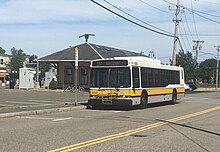
Numbers from 131 to 137 operate in the Melrose area; their routings are based on routes operated as part of the former Eastern Massachusetts Street Railway, which was folded into the MBTA system in 1968. The since-discontinued 136 and the 137 were briefly operated as far as Lowell and Lawrence, their original Eastern Mass terminals, while under MBTA control. The 132 was a Service Bus Lines route which was not operated by the MBTA until 1975.[4]
| Route | Description | MBTA link |
|---|---|---|
| 131 | Melrose Highlands–Oak Grove or Malden Center station | Link |
| 132 | Redstone Shopping Center–Malden Center station | Link |
| 134 | North Woburn–Wellington station | Link |
| 137 | Reading Depot–Malden Center station | Link |
171
Route 171 is a special low-service route – a replacement for early morning CT3 service when it was cut back from Logan Airport in 2002. Other numbers in the 170s were previously used for special routes, largely short-lived routes serving industrial areas.[4]
| Route | Description | MBTA link |
|---|---|---|
| 171 | Logan Airport terminals–Nubian station | Link |
201–202
The 20 belt route was created by the M.T.A. in 1962 as a combination of the 20 and 21 stub routes inherited from BERy. In 2005, the MBTA redesignated the two directions of the loop as the 201 and 202 to avoid confusion about which way each bus ran.[4]
| Route | Description | MBTA link |
|---|---|---|
| 201 | Fields Corner Loop via Neponset Avenue | Link |
| 202 | Fields Corner Loop via Adams Street | Link |
210–245

These routes operate in the Quincy area. Routes 210-245 are based on routes originally operated by the Eastern Massachusetts Street Railway (folded into the MBTA in 1968) which mostly ran into Fields Corner station. When the Red Line's Braintree Branch opened in phases in 1971 and 1980s, these routes were rerouted to terminate at the new rapid transit stations (principally Quincy Center).[4]
| Route | Description | MBTA link |
|---|---|---|
| 210 | Quincy Center station–Fields Corner station | Link |
| 211 | Quincy Center station–Squantum | Link |
| 215 | Quincy Center station–Ashmont station via West Quincy | Link |
| 216 | Houghs Neck–Quincy Center station via Germantown | Link |
| 217 | Quincy Center station–Ashmont station | Link |
| 220 | Hingham Depot–Quincy Center station | Link |
| 222 | East Weymouth–Quincy Center station | Link |
| 225 | Weymouth Landing–Quincy Center station | Link |
| 226 | Columbian Square–Braintree station | Link |
| 230 | Montello station–Quincy Center station | Link |
| 236 | South Shore Plaza–Quincy Center station | Link |
| 238 | Holbrook/Randolph station–Quincy Center station | Link |
| 240 | Avon Square–Ashmont station | Link |
| 245 | Quincy Center station–Mattapan station | Link |
350–354
These routes operate in the Burlington and Woburn area. They are the descendants of the Eastern Massachusetts Street Railway's Lowell–Boston route, which was inherited intact by the MBTA in 1968 and soon cut back to Burlington.[4]
| Route | Description | MBTA link |
|---|---|---|
| 350 | North Burlington–Alewife station | Link |
| 351 | Bedford Woods Drive–Third Avenue | Link |
| 354 | North Burlington–State Street, Boston | Link |
411–465
These routes operate in the Lynn area and the North Shore. Two routes that run to Haymarket have weekend short-turn variants (labeled with a W suffix) that terminate at Wonderland. The 411 and 430 were Service Bus Lines routes that were acquired by the MBTA in 1975; the other routes are largely Eastern Massachusetts Street Railway routes acquired in 1968.[4]

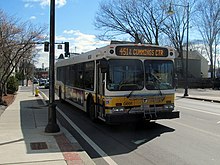
| Route | Description | MBTA link |
|---|---|---|
| 411 | Kennedy Drive or Jack Satter House–Malden Center station | Link |
| 424 | Eastern Avenue & Essex Street–Wonderland station | Link |
| 426 | Central Square, Lynn–Haymarket station | Link |
| 426W | Central Square, Lynn–Wonderland station | Link |
| 428 | Oaklandvale–Haymarket station | Link |
| 429 | Northgate Shopping Center–Central Square, Lynn | Link |
| 430 | Saugus Center–Malden Center station | Link |
| 435 | Salem Depot–Central Square, Lynn via Peabody Square | Link |
| 436 | Liberty Tree Mall–Central Square, Lynn via Goodwin Circle | Link |
| 439 | Nahant–Wonderland station | Link |
| 441 | Marblehead–Wonderland station via Paradise Road | Link |
| 442 | Marblehead–Wonderland station via Humphrey Street | Link |
| 450 | Salem Depot–Haymarket station | Link |
| 450W | Salem Depot–Wonderland station | Link |
| 451 | North Beverly station–Salem Depot | Link |
| 455 | Salem Depot–Wonderland station | Link |
| 456 | Salem Depot–Central Square, Lynn | Link |
501–558
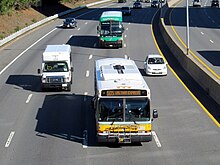
These routes operate express between Newton and downtown Boston via the Massachusetts Turnpike (I-90). The 500 series routes were created by the MBTA in the 1960s to take advantage of the newly constructed turnpike extension into Boston. The 550 series routes were Middlesex and Boston Street Railway routes to Newton Corner that were extended to downtown Boston in the 1960s and taken over by the MBTA in 1972. They were cut back to Newton Corner in 2020.[4]
| Route | Description | MBTA link |
|---|---|---|
| 501 | Brighton Center–Federal Street & Franklin Street | Link |
| 504 | Watertown Yard–Federal Street & Franklin Street | Link |
| 505 | Waltham Center–Federal Street & Franklin Street | Link |
| 553 | Roberts–Newton Corner | Link |
| 554 | Waverley Square–Newton Corner | Link |
| 556 | Waltham Highlands–Newton Corner | Link |
| 558 | Riverside station–Newton Corner | Link |
Privately operated routes

The MBTA provides partial subsidy for some suburban routes outside its usual service area that connect with MBTA bus, subway, or commuter rail service. Routes 712-716 are radial commuter routes were taken over from various private operators (Rapid Transit Inc. for the 712/713, Nantasket Transportation for the 714, and Hudson Bus Lines for the 716).[4]
The non-numbered routes (listed here by their designator on MBTA maps) are local circulator services founded by the municipalities with partial MBTA subsidy.[4] All are operated by private companies under contract, except for the Beverly Shuttle which is operated by the Cape Ann Transportation Authority.
| Route | Description | MBTA link | Operator |
|---|---|---|---|
| 712 | Point Shirley, Winthrop–Orient Heights station via Revere Street | Link | Paul Revere Transportation |
| 713 | Point Shirley, Winthrop–Orient Heights station via Winthrop Center | Link | |
| 714 | Pemberton Point, Hull–Station Street, Hingham | Link | DPV Transportation |
| 716 | Cobbs Corner–Mattapan station | Link | |
| BED | Bedford Local Transit | Link | Town of Bedford |
| BEV | City of Beverly Shuttle | Link | CATA |
| LEX | Lexington Lexpress (4 routes) | Link | Town of Lexington |
| MIS | Mission Hill LINK | Link | Volunteers |
References
- ^ Beginner's Guide to the Bus, Massachusetts Bay Transportation Authority, retrieved August 2, 2024
- ^ "Bus Network Redesign". Massachusetts Bay Transportation Authority. Retrieved August 5, 2022.
- ^ "Phase 1 of Bus Network Redesign Launches December 15 to Bring More Frequent Service, Better Routes" (Press release). Massachusetts Bay Transportation Authority. October 7, 2024.
- ^ a b c d e f g h i j k l m n Belcher, Jonathan. "Changes to Transit Service in the MBTA district" (PDF). Boston Street Railway Association.
- ^ "Service Delivery Policy" (PDF). Massachusetts Bay Transportation Authority. July 13, 2006. pp. 3, 26–27. Archived from the original (PDF) on March 31, 2012. Retrieved July 24, 2014.